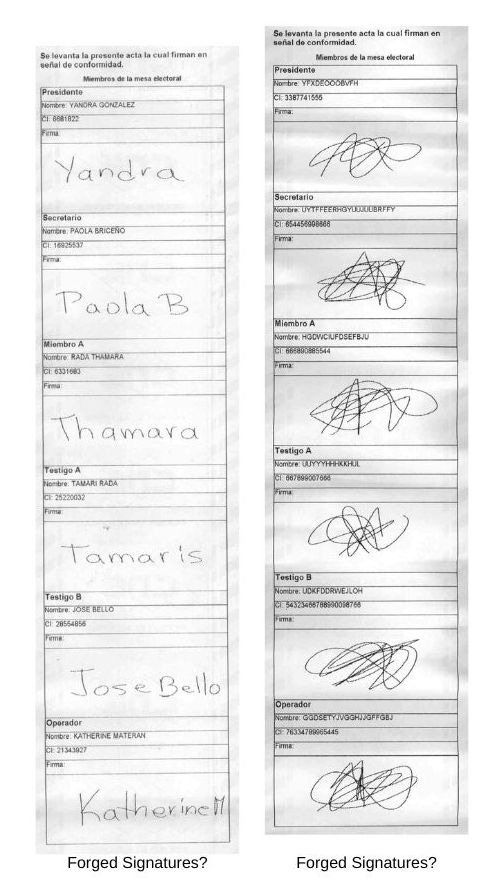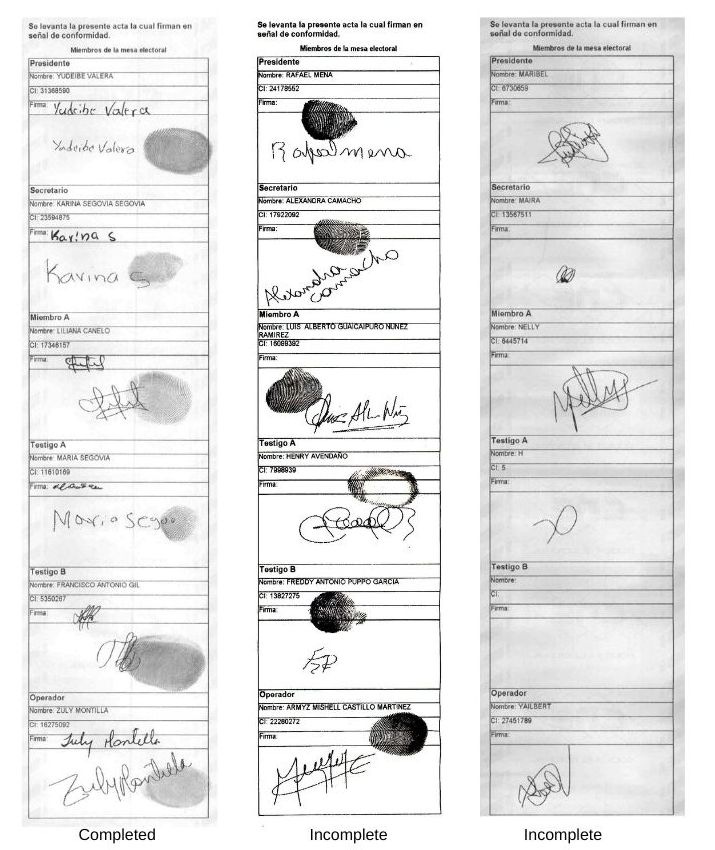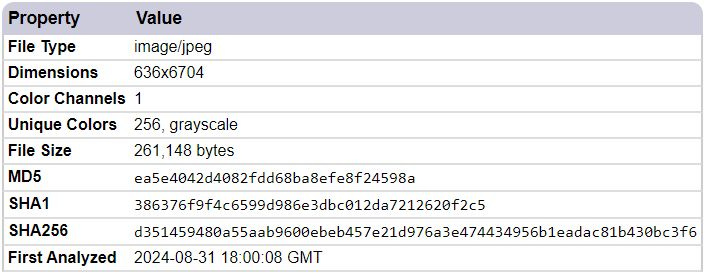The Venezuelan Opposition's Data Appears Fraudulent, Can’t Be Validated
More questions about the validity of the opposition’s tally sheets continue to rise while the Department of State zips its lip about the findings

Despite what you may hear about Venezuelan President Nicolás Maduro declaring himself the winner in Venezuela's most recent presidential election, nothing could be further from the truth. Such a claim relies heavily on willful ignorance about one of the most secure electoral systems in the world and the opposition claiming victory using data published outside that system.
Data that has been impossible to authenticate.
No one in the U.S. would accept results from President Joe Biden, former President Donald Trump, or Vice President Kamala Harris if they claimed victory with electoral data published outside the system, regardless of how much they cried fraud. Meanwhile, the world is supposed to blindly accept, as some commentators have, that this is what happened in another country because a U.S.-backed opposition party that has attempted multiple coups said so.
An Unlikely Sudden Change of Heart
A recent investigation of registered voters by a group of independent researchers dedicated to analyzing the election process in Venezuela called Misión Verdad (Mission Truth) highlights the over 6 million people who identify as Chavistas (Maduro supporters). The analysis suggests that millions (over half) would have to have woken up on election day and decided to vote against their chosen candidate. Would you believe a story that says more than half of Democrats woke up on election day and decided to vote for Trump in November? Of course not.

Missing Signatures From Tally Sheets
Looking at the tally sheets, it’s impossible to ignore the signatures at the bottom of each one making them seem valid upon initial inspection. However, most of the signatures presented in the data supplied by the opposition are digital. Digital signatures are gathered ahead of time to later compare them against signatures signed in ink should there be a dispute about validity.
As in any election, the ballots cast determine winners. Inked signatures are used to certify the ballot counts on the tally sheets. The problem with the opposition’s data is that an estimated 90% of tally sheets lack certification via inked signatures. This glaring fact should be the subject of much scrutiny in the public discourse, yet it isn’t part of the conversation.
Additionally, a thumbprint is also part of the validation process ensuring that the tally sheets are authentic which the vast majority of the opposition’s tally sheets do not have.

What’s With the QR Codes?
Scanning the QR codes on the tally sheets provided by the opposition only confirms the vote counts on each sheet which does nothing to affirm them.
For example, it generates results like this:
190801004.01.1.0001!50,1,0,0,0,0,0,0,1,0,0,0,0,0,0,0,0,1,0,0,0,0,0,0,0,0,0,0,0,0,0,0,0,1,0,37,0,0!0!0
Upon initial inspection, this might create confusion (as it did with me and many others). However, since no one has clarified this in any detail, I will try.
Looking at the image below should help explain it further. My image only shows the vote counts for Maduro on this particular sheet to explain what the numbers mean. The first part of the number (190801004.01.1.0001) identifies the sheet on which the QR code is found as seen in the middle of the photo. The rest of the number confirms the vote counts found on each tally sheet for each candidate based on the political affiliation of the voter (PSUV, PCV, etc).

Searching for the numbers online does nothing but produce results for links to websites offering to solve a mathematical problem. Despite what many on social media are saying, the QR codes do not validate the authenticity of the tally sheets.
Further, when adding this to my previous reports highlighting differences between versions of the tally sheets (the opposition has v1 and v2 on its website) while taking into account that neither The Washington Post, the Associated Press, nor The Carter Center has been able to verify their authenticity and looking at the questionable sheets mentioned earlier, there’s a sense of potentially fraudulent ballots.
We certainly would not consider them valid in the U.S.
Metadata Missing From Tally Sheets
Several observers who have conducted a deep forensic analysis of the tally sheets pointed out that location information in the metadata has been scrubbed from them. An allegation that was simple to verify through a quick study of randomly selected tally sheets.
Metadata is information that is embedded within a digital image file. It can help organize, sort, and find image files in a library. It can also make data more accessible and useful for specific tasks and decision-making. Location data is often used to certify images that may appear fraudulent or AI-generated. This is critical information for journalists to use in verification. As of this writing, it appears this information was intentionally removed.
Are Cyberattacks Motivated by the U.S.?
Well-known hacker ASTRA has admitted to attacking Venezuela’s electoral system with Distributed Denial of Service (DDoS) attacks in an interview with Mexican media outlet PubliMetro. ASTRA, the leader of Cyber Hunters — a hacker group that could easily be affiliated with U.S. intelligence agencies — has taken on groups like ISIS and has used extensive networks of bots to attack foreign governments.
These attacks often coordinate with U.S. interventions and are seemingly motivated by similar interests to those of Western governments. To be clear, there are no reported connections between ASTRA and any government.
The Government’s Precinct-Level Results
It’s worth noting that the governments of Brazil, Mexico, Colombia, and various other Western countries alongside non-governmental organizations (NGOs), demand that the Venezuelan government publish precinct-level results validating Maduro’s reelection (as it has done in the past). But ASTRA’s cohorts openly admit to leading a charge crippling the National Electoral Council’s website preventing it from publishing its evidence as requested.
The Venezuelan National Electoral Council’s website was still down as of this publishing.
Hackers posing as Anonymous who are closely associated with ASTRA are also bragging about taking down various other Venezuelan government sites and claiming to be inside much of the country’s infrastructure. While doubts about the hacker group's involvement grow, these actions reek of U.S. covert action using “Anonymous” as a disguise on social media as part of a broader anti-Maduro propaganda campaign. This, however, is speculative at this point.
Hackers Cast Doubt, Bolster Maduro’s Claims
Whatever their intentions may be, the knowledge of hackers openly bragging about being inside Venezuela’s electoral system casts doubt about the opposition’s victory and serves to bolster Maduro’s claims of foreign interference in the country’s election. To decipher exactly what they are responsible for will likely be an impossibility for a long time. Their need to brag and expose themselves for applause from social media users makes their interference quite clear.
On Tuesday, opposition leader María Corina Machado, who was barred from running for president after leading multiple failed coups and publicly asking Israeli Prime Minister Benjamin Netanyahu to invade Venezuela, also felt the need to brag about her months-long efforts to plan and lead cyberattacks against the nation’s infrastructure while also coordinating the publishing of a parallel version of the official election results on a third-party website.
“Who did it? More than a million Venezuelans inside and outside the country, so many Venezuelans who are experts in technology. Everyone was there, without rest. It took months and months to prepare this. Nobody slept until this was achieved. A monumental thing,” Machado said in an interview with Venezuelan journalist Carla Angola.
U.S. Department of State Silence Is Telling
Initially, Secretary of State Antony Blinken announced that Maduro lost in a landslide election based on the opposition’s tally sheets. However, upon asking about the lack of authentication by anyone who has scrutinized them, the Department of State began walking back that claim and instead began demanding that Maduro’s government provide proof that he won based on its own timeframe and ignoring that set aside by Venezuela’s Constitution.
Despite bringing all of this to the attention of the U.S. Department of State and asking for anything they may have to help authenticate the opposition's tally sheets, they issued a statement on Thursday ignoring the growing evidence of possible fraud and the National Electoral Council’s announcement declaring they would publish full election results as required by Venezuela’s Supreme Court of Justice.
“In spite of repeated calls from Venezuelans and the international community, the Maduro-controlled National Electoral Council (CNE) has failed to substantiate its announced results by producing original tally sheets, as it did following the 2013 and 2018 elections,” read the statement.
The Department of State is also ignoring independent observers like those from Brazil who announced they found no fraud in the reelection of Maduro as Erik Prince (of Blackwater fame) is seeking $100 million from President Biden to remove Maduro from power. This revelation came as Anonymous and the Cyber Hunters announced a cyberattack on Venezuela’s Ministry of Defense just as an alleged attack on the country’s power grid shut much of the country down Friday.
Meanwhile, Venezuela’s Ambassador to the U.N., Samuel Moncada provided more evidence unmasking a broad and detailed U.S.-backed coup attempt through a potentially fraudulent election. You can use auto-translated captions on the video below to follow what Mocada is saying. It’s alarming indeed.
*Special thanks to journalists from independent news outlets and experts in digital forensics for assistance in producing this article.
Follow my continuing coverage of the Venezuela elections below
I’m a freelance writer and independent journalist. You can find me on TikTok, Twitter, Facebook, Instagram, Mastodon, and Threads. To support my work become a paid subscriber or donate on Venmo, PayPal, or CashApp







